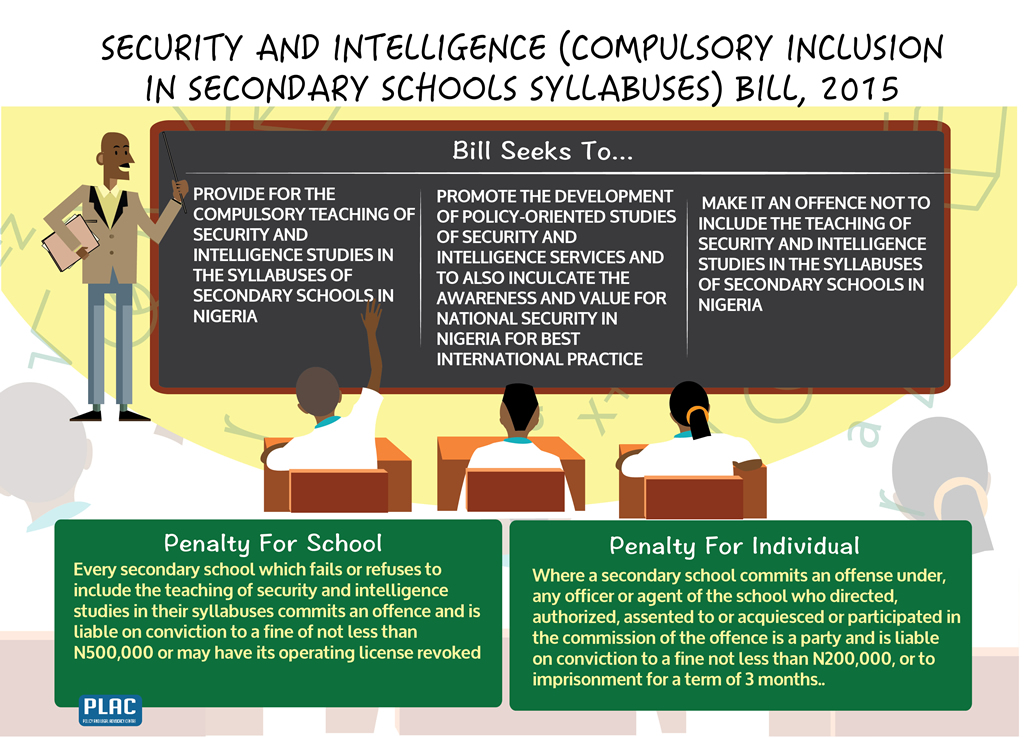HB 123: Security and Intelligence (Compulsory Inclusion in Secondary School Syllabus) Bill, 2015
Download Bill Bill Analysis Download Bill Analysis Infograph
Sponsor:
Hon. Ayuba Mohammed Bello
State:
BORNOParty:
ALL PROGRESSIVES CONGRESSBill Status: Awaiting Committee Report
- First Reading: 19/11/2015
- Second Reading: 10/12/2015
- Committee Referred To: Committee of the Whole
- Consolidated with:
- Date Reported out of Committee:
- Third Reading:
- Reconsidered and Passed:
Bill Analysis:
SHORT TITLE
Security and Intelligence (Compulsory Inclusion in Secondary Schools Syllabuses) Bill, 2015
OBJECTIVE OF THE BILL
The Bill seeks to –
- Provide for the compulsory teaching of security and intelligence studies in the syllabuses of secondary schools in Nigeria;
- Promote the development of policy-oriented studies of security and intelligence services and to also inculcate the awareness & value for National Security in Nigeria for best international practice;
- Make the non-inclusion of the teaching of security and intelligence studies in the syllabuses of secondary schools in Nigeria, an offence.
NUMBER OF CLAUSES/PARTS
The Bill has 5 Clauses including interpretation and short title
LEGAL IMPLICATIONS OF THE BILL
- Constitutional Mandate of the National Assembly (NASS):
According to Section 27 of the Second Schedule to the 1999 Constitution (as amended) the NASS shall have power to make laws with respect to university education, technological education or such professional education. Section 28 of the same Schedule further specifies that the power shall include establishing an institution for the purpose of university, technical or professional education. The Constitution did not vest the power to develop curriculum for secondary school on the National Assembly.
2. Legal Mandate to Alter School Curriculum
Other legislations like the Education (National Minimum Standard & Establishment of Institution) Act and National Commission for Mass Literacy, Adult and Non-formal Education (NCMANE) Act however provide for development of school curriculum. Section 4(1) of the Education Act provides that the responsibility for the establishment and maintenance of minimum standards in secondary schools shall be vested in the Minister. The Act provides under Section 6(4) that the Minister may by notice published in the Federal Gazette give directives in respect of curriculum to be followed at both junior and senior secondary.
National Commission for Mass Literacy, Adult and Non-formal Education (“the Commission”) is empowered under Section 3(h) of the NCMANE Act to conduct research in various fields such as curriculum development, learning and teaching methodologies, etc. The Act provides for the Commission may from time to time collate materials and information on mass literacy with the Ministry of Education, United Nations Educational, Scientific and Cultural Organisation (UNESCO). The Act in this regard did not list the National Assembly as part of the bodies concerned with developing school curriculum.
SUMMARY OF THE PROVISIONS OF THE BILL
1. Security and Intelligence Studies: -
It shall be a policy of government to ensure that Security and Intelligence Studies be taught in all secondary schools in Nigeria.
2. Offences and Penalties
Every secondary school which fails or refuses to include the teaching of security and intelligence studies in their syllabuses commits an offence and is liable to a fine of not less than N500,000 or may have its operating license revoked.
Where a secondary school commits an offense under this Bill (when it becomes law), any officer or agent of the school who directed, authorized, assented to or acquiesced or participated in the commission of the offence is a party and is liable on conviction to a fine not less than N200,000 or to imprisonment for a term of 3 months.
3. Regulation by the Government: -
The Federal Ministry of Education shall in liaison with the Ministry of Defense, Office of the National Security Adviser, Ministry of Police Affairs and Minister of Interior; prepare the security and intelligence studies subject content (Clause 3)
CONCLUSION
The Bill seeks to criminalize non-inclusion of security and intelligence studies in the syllabuses of secondary schools in Nigeria. The reasoning ostensibly is to sensitize secondary schools on the rising trend of student kidnaps and insecurity around schools. Though enlightening students on safety and security issues ranging from how to raise alarm when anything suspicious happens and escaping threats of any kind is crucial, it is the mandate of security agencies to protect and secure the lives of citizens, which includes students.
Though Section 4(4)(a) of the 1999 Constitution (as amended) provides that the National Assembly shall have powers to make laws with respect to any matter in the Concurrent Legislative List set out in the first column of Part II of the Second Schedule to the Constitution, it does not give the National Assembly powers to develop or alter secondary school curriculum. The Second Schedule to the Constitution in expounding this provision states that the power shall relate to make laws with respect to university education, technology education or such professional education as may from time to time be designated by the National Assembly. In effect, the National Assembly does not have the legal mandate to alter Nigeria’s secondary school curriculum.
Rather than only liaising on how to prepare a security and intelligence studies course content, the Federal Ministry of Education, Ministry of Defense, Ministry of Police Affairs, Ministry of Interior and Office of the National Security Adviser should strategize on how better to work together to ensure the safety of students, not just in secondary schools but at all levels of education.
Infographic:
